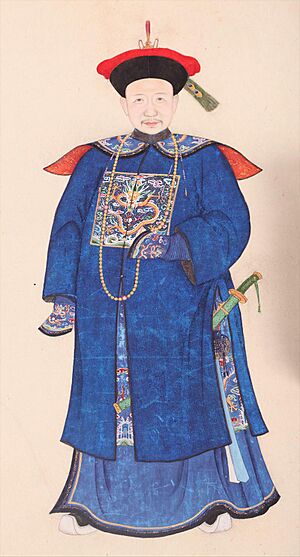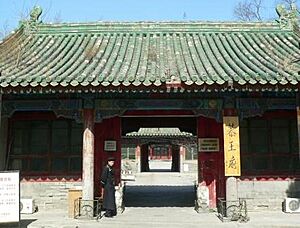Heshen facts for kids
Quick facts for kids
Heshen
|
|
|---|---|
 |
|
| Chief Grand Councillor | |
| In office 1797–1799 |
|
| Monarch | Jiaqing Emperor |
| Preceded by | Agui |
| Succeeded by | Yongxing |
| Grand Councillor | |
| In office 1776 – 1799 (as the Chief Grand Councillor since 1797) |
|
| Monarch | Qianlong Emperor Jiaqing Emperor |
| Grand Secretary of the Wenhua Hall | |
| In office 11 September 1786 – 2 February 1799 |
|
| Monarch | Qianlong Emperor Jiaqing Emperor |
| Preceded by | Cai Xin |
| Succeeded by | Dong Gao |
| Minister of Personnel | |
| In office 4 September 1784 – 16 September 1786 Serving with Liu Yong
|
|
| Monarch | Qianlong Emperor |
| Preceded by | Umitai |
| Succeeded by | Fuk'anggan |
| Minister of Revenue | |
| In office 26 April 1780 – 4 September 1784 Serving with Liang Guozhi
|
|
| Monarch | Qianlong Emperor |
| Preceded by | Feng Yinglian |
| Succeeded by | Fuk'anggan |
| Personal details | |
| Born |
Shanbao (善保)
1 July 1750 Beijing, Qing Empire |
| Died | 22 February 1799 (aged 48) Zhizhai, Beijing, Qing Empire |
| Spouse | Feng Jiwen |
| Domestic partner | Lady Chang |
| Relations | Gurun Princess Hexiao (daughter-in-law) Helin (brother) |
| Children | Fengšeninde 1 son 3 daughters |
| Occupation | Official |
| Noble titles | 1st class baron→3rd class earl→1st class duke |
Heshen (Manchu: ᡥᡝᡧᡝᠨ, Möllendorff: Hešen; Chinese: 和珅; pinyin: Héshēn; Wade–Giles: Ho2-shen1; 1 July 1750 – 22 February 1799) was a very powerful official in China during the Qing dynasty. He belonged to the Manchu Niohuru clan. Heshen was a favorite of the Qianlong Emperor and became one of the most influential people in the government. After the Qianlong Emperor passed away, the new emperor, Jiaqing Emperor, took away all of Heshen's vast wealth and ordered his death. Heshen is remembered as one of the richest people in history.
Heshen was born Shanbao (善保), but his name was later changed to Heshen. His courtesy name, a special name used by adults, was Zhizhai (致齋). He was part of the Plain Red Banner, which was a group of families in the Manchu military and social system.
Contents
Early Life and Rise to Power
Heshen was the son of a Manchu military officer. He went to a special school for boys from important Manchu families. Sadly, he lost his mother when he was young. It is said that he and his younger brother had a difficult life with their stepmother.
Despite these challenges, Heshen was a very smart student. He learned several languages, including Middle Mandarin, Manchu, Mongolian, and Tibetan. In 1772, he started working in the Imperial Palace as an imperial bodyguard. He was stationed at the palace gates.
How He Gained Influence
Heshen quickly moved up in the government. Within a year, he became a vice-president in the Ministry of Revenue, which managed the empire's money. Just two months later, he was made a Grand Councilor, a very high position. Three months after that, he became the Minister of the Imperial Household Department. This job was usually given to the most respected officials.
By 1777, when he was only 27, Heshen received a special honor: he was allowed to ride a horse inside the Forbidden City. This was a rare privilege, usually given only to much older, high-ranking officials. Soon, Heshen was in charge of both the Ministry of Revenue and the Civil Council. This gave him control over all the empire's money and allowed him to place his own trusted people in important government jobs.
Heshen's power grew even stronger when his son married Hexiao, the Qianlong Emperor's favorite daughter, in 1790. With the emperor's full support, Heshen felt free to act as he wished. He began to use his power unfairly, taking money from the public on a large scale. His friends in the government followed his example. Military leaders even made wars last longer to get more money.
Heshen took over many official powers and jobs, including that of Grand Councilor. He regularly stole money meant for the public and for taxes. Taxes were raised many times, which made life very hard for ordinary people. Their problems got worse because of severe floods from the Yellow River. This was partly due to officials like Heshen taking money that was supposed to be used to fix canals and dams. The price of rice also went up, causing many people to starve. This widespread unfairness and favoritism helped lead to the decline of the Qing dynasty.
In 1793, Heshen was in charge of welcoming the Macartney Embassy from Britain to the imperial court.
His Great Wealth and Downfall
After the Qianlong Emperor stepped down from power in February 1796, it became clear how much Heshen had misused his position. However, Qianlong still secretly ruled China as the "Retired Emperor." It wasn't until Qianlong's death on 7 February 1799 that the new emperor, the Jiaqing Emperor, could take action against Heshen.
Just five days after Qianlong's death, Heshen was arrested. An official order declared him guilty, and he was sentenced to death. The sentence was carried out on 22 February 1799.
What Happened to His Fortune?
During the 24 years that Heshen was close to the emperor, he gathered an enormous amount of wealth. When the Jiaqing Emperor took over Heshen's property, it included:
- 2,790 rooms in his homes
- 12,000 acres of land
- Many bank and pawn shop branches
- Huge amounts of gold and silver, including 58,000 taels of pure gold and millions of silver ingots
- Foreign silver dollars and copper coins
- Valuable items like 300 kilograms of top-quality ginseng, 1,200 jade charms, and many pearl bracelets, rubies, and large pearls
- Dozens of solid gold or silver dishes
- Thousands of bolts of fine silk and animal furs
- 7,000 sets of fine clothing
- Hundreds of thousands of bronze, tin, and porcelain items
- 24 highly decorated solid-gold beds with gemstones
- 460 high-quality European clocks
His total wealth was estimated to be worth 1,100 million taels of silver. This was said to be equal to the Qing government's income for 15 years! The Jiaqing Emperor accused Heshen of 20 crimes, including using his power unfairly and collecting too much wealth.
Heshen's actions showed how much unfairness existed in the government and military during the Qing dynasty. This problem had been passed down from the earlier Ming dynasty. Military groups became less effective, and the Chinese army lost much of its fighting spirit. The Qianlong Emperor's major military campaigns cost a huge amount of money, partly because officials like Heshen were taking funds. These massive government expenses led to money problems later in the Qing dynasty.
Different Ideas About Heshen
Some people believe that Heshen's wealth came mostly from gifts given to him by the Qianlong Emperor, not just from unfair actions. The idea that Heshen was a completely unfair official became popular after his death. This view came from historical records kept by the Qing dynasty. However, only the emperor could decide what was kept in these records. This means the records might have been biased against Heshen.
Heshen was a very powerful official, and he might have seemed like a threat to the authority of the Jiaqing Emperor. Other officials during Qianlong's time might have been afraid of Heshen or jealous of his power. The Jiaqing Emperor might have used legal reasons to justify these feelings and sentence Heshen to death.
Heshen's Former Home

Many years after Heshen died, his former home was given to Prince Gong as his official residence. This estate is now known as the Prince Gong Mansion. Today, it is a museum and a popular place for tourists to visit. You can find it at 17 Qianhai Road West in Beijing.
Family Connections
- Heshen had a younger brother named Helin (1753–1796).
- His wife was Feng Jiwen, and they had a son named Fengšeninde (1775–1810).
- Fengšeninde married Gurun Princess Hexiao, who was the tenth daughter of the Qianlong Emperor.
See also
 In Spanish: Heshen para niños
In Spanish: Heshen para niños
 | William M. Jackson |
 | Juan E. Gilbert |
 | Neil deGrasse Tyson |

